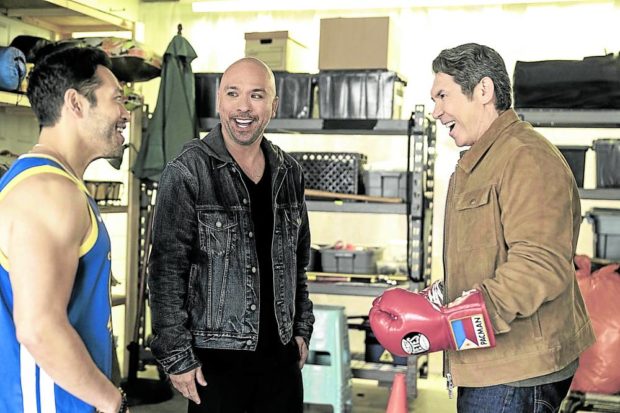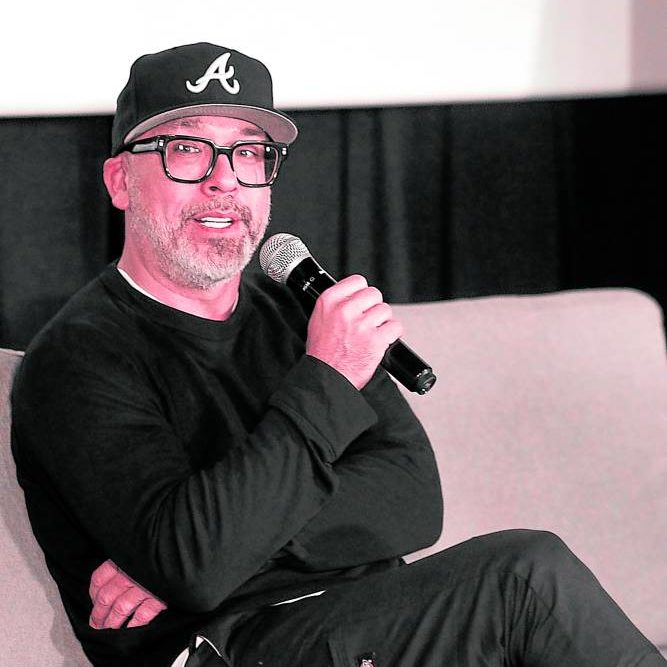Jo Koy on how Steven Spielberg helped him bring ‘Easter Sunday’ to life

From left: Eugene Cordero, Jo Koy and Lou Diamond Philips in “Easter Sunday”
We have already interviewed Jo Koy a number of times in the past, but seeing the 51-year-old Filipino-American stand-up comic in the flesh last Tuesday and talking to him about “Easter Sunday,” the first Hollywood-produced movie about Pinoys and the Fil-Am culture, certainly felt like one of those memorable full-circle moments—and here’s why.
During a one-on-one video call two years ago, as Jo and I were discussing how his third Netflix special “In His Elements,” came about, Jo suddenly went off-topic and dropped a bombshell on us. “Hey, I have a scoop for you,” Jo proudly said with a twinkle in his eyes. “I’m happy to announce that I’m developing something exciting with Steven Spielberg’s Amblin [Entertainment].”
To say the least, we were shocked by Jo’s unexpected announcement. After all, it isn’t every day that the legendary director-producer goes out of his way to bankroll a mainstream production tackling themes relevant to Filipinos.
“The movie is based on an idea that I have, called ‘Easter Sunday,’ which will highlight a Filipino family in the States during that special holiday,” he explained to us then. “And, of course, it will feature a majority of Filipinos in the cast. Working with Spielberg has been amazing!”
At the time, Jo said that he was also developing a TV deal with the people behind “Fresh Off the Boat.” He quipped, “[But] the work doesn’t stop there, man—and I’m grateful!”
Jo said that he isn’t one to take things for granted. He then asked his team to get our contact details before we wrapped up the interview. Imagine how pleasantly surprised we were when, a few months later, we received a box full of Jo Koy merchandise sent all the way from his office in LA!
Fast-forward two years later, a few hours before Jo was scheduled to welcome homegrown Pinoy viewers and the local press to red-carpet screenings of “Easter Sunday” at the Director’s Club of SM Mall of Asia.
When we asked Jo to describe how supportive Spielberg was during the shoot, he recalled, “He gave me everything that I wanted for the film — it was crazy! Like, we would get into creative differences and of course [the decisions] would always revert back to him. Then, all of a sudden, miraculously, Steven would be like, “Oh, OK, yeah, Jo,” And that was cool. He really had my back and my best interest in mind.
“Don’t get me wrong. I had a great team of writers, but I didn’t write the movie — that’s a very hard thing to do. So I could only pitch in my ideas to them and I would tell them as many of my stories as I could, then they would write those into the movie. But there were obstacles that needed someone like Steven Spielberg so that we could hurdle them.
“That’s how much love [Spielberg] has for this project, you know? Like, let this sink in, guys: This is the first time that a movie with an all-Asian cast with a Filipino lead is produced by a major studio!
“So, that’s the reason why I’m overwhelmed. I’m living a dream. This [press con in the Philippines] is beautiful. And I’m with my son Joe here and my sister Gemma’s here. Like, this is what we’ve always dreamed of!”
“Easter Sunday,” which began its theatrical run in Philippine theaters last Wednesday, follows the story of struggling comedian Joe Valencia (Jo Koy), who’s on the verge of getting cast in a TV sitcom.
As the LA-based stand-up comic awaits word from the show’s producers, he and his son (Brandon Wardell) must first return to his mother Susan’s (Lydia Gaston) home in Daly City to celebrate Easter with his big, bickering, eating, drinking, laughing and loving Filipino-American clan.
The situation becomes even more riotous when Joe finds himself helping his cousin Eugene (Eugene Cordero) deal with a tricky situation involving Manny Pacquiao’s stolen boxing gloves.

Eva Noblezada
Fictionalized version
Others in the cast are Tia Carrere (as competitive Tita Teresa), Lou Diamond Philips (as a fictionalized version of himself), the very appealing Eva Noblezada (as Tala, Joe Junior’s love interest) and the hilarious Tiffany Haddish (as the cop who used to date Joe).
Jo explained why the opportunity to represent Filipinos and other minority groups in a mainstream Hollywood project is a significant milestone is his red-hot career.
“For the most part, you don’t really get offers for these roles—they simply don’t exist,” he said matter-of-factly. “So, all you can do is pitch your stories and hope to God somebody would be willing to help you realize your pitch, especially when you’re not the majority color.
“If you’re Filipino, you won’t get any offers, so you’ve got to create your own idea and figure out a story that they’d be willing to support. That’s why I also want to have my hands behind the camera, to help open doors for others.
“Back in the day, it didn’t matter if you’re Filipino or Asian—they’ll just lump you all in a group. That’s how racist Hollywood was. They didn’t care if you were Filipino or Chinese or Korean … they simply didn’t care about specificity, ethnicity or individuality.
“Let’s talk about stereotypes. You know, I always tell this joke about Filipino nurses. I know that every Filipino family has a nurse. I got it, too. I’ve got 10 nurses in my family. I have my sister and an aunt who has nine nursing homes, you know? And they’ve been living in America for 40 years!
“They go to work daily, 12 hours a day, saving lives and taking care of people. And then, when they go home, they turn on the TV and watch a movie or a series set in a hospital—and not one of those hospitals has a Filipino nurse!
“And that’s what I’m talking about. This is why I want to create characters that can represent us. Other than nurses, why not a Filipino CEO of a business … or a cop or singer? Let’s just have these roles for everybody. I want to help open the door, not just for Filipinos, but for everyone. That’s what this whole movie is about. To showcase Asians in a Hollywood production.”

Jo Koy at the press con last Tuesday —PHOTOS COURTESY OF UNIVERSAL PICTURES INTERNATIONAL
Jo said that while it’s true that his humor may have caught fire with audiences in the US and around the globe, he said that can always retrace part of his roots and influences back to the days when he was a 4- or 5-year-old boy living in the Philippines.
“It’s so funny. When I arrived here and got off the plane the other day and they put us in this holding area while we were waiting for our bags and stuff, there was a scent that was inside that room,” he said. “I looked at my son because that fragrance brought me back to when I was 7 years old. It reminded me of my little Lola and Lolo. It got me thinking about when we were living here.
“My dad was in the military and we didn’t have cable TV or anything like that. So I was watching Filipino TV shows for entertainment. The characters and actors didn’t have to speak Tagalog because you could just enjoy the slapstick or physical comedy of Tito, Vic and Joey. I would always watch Dolphy all the time because he was so funny. And that was how I learned Tagalog.
“So yeah, entertainment has always been in my—and every Filipino’s—blood. Like, you would just be mesmerized by someone with a heavy accent, then she would start singing and dazzling everybody because she would sound like Barbra Streisand. It’s just phenomenal! It blows your mind because you think you’re seeing superheroes—how did she do that?
“And that’s why entertainment is in my blood. It came from this side of my family. That’s why my sister’s a singer. That’s why I do standup comedy. We’re all so heavily inspired by this Filipino side of my family.”
For comedy aspirants out there who want to follow in his footsteps, does the popular stand-up comic think that being funny is inborn, or is it something that can be learned or honed?
“I don’t think being funny can be taught,” Jo admitted. “I always say this: I get it from my mom’s side. Comedy to me is a gift. You can learn all you want, but ad-libbing, improvisation and all that skill set … you gotta be born with it. And that’s the one thing I take pride in when I get onstage.”
Indeed, as Jo Koy’s latest touring comedy show would tell you, “Funny is funny.”